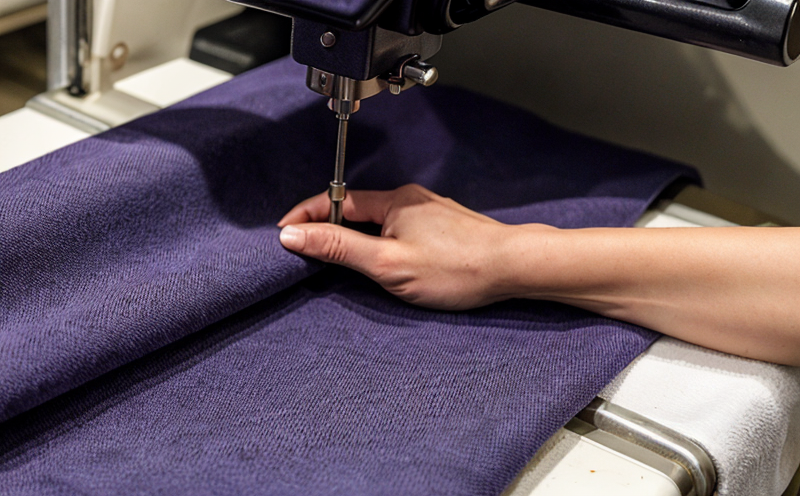Testing the abrasion resistance of textile fabrics
The Importance of Testing the Abrasion Resistance of Textile Fabrics Why Businesses Need This Laboratory Service
In todays fast-paced textile industry, manufacturers are constantly pushing the boundaries to create innovative and durable fabrics that meet the demands of consumers. However, the wear and tear on these fabrics can be significant, especially when subjected to repeated rubbing or friction. This is where testing the abrasion resistance of textile fabrics comes into play a crucial laboratory service that helps businesses ensure their products withstand the test of time.
At Eurolab, we understand the significance of this service in maintaining product quality and customer satisfaction. In this article, we will delve into the world of abrasion testing, highlighting its importance, benefits, and key advantages for textile manufacturers.
What is Testing the Abrasion Resistance of Textile Fabrics?
Abrasion resistance refers to a materials ability to withstand wear and tear caused by friction or rubbing against another surface. In the context of textile fabrics, this means assessing their durability in the face of repeated contact with other materials or surfaces. The goal of abrasion testing is to determine how well a fabric will hold up under normal use conditions.
Why is Testing the Abrasion Resistance of Textile Fabrics Essential for Businesses?
The consequences of poor abrasion resistance can be far-reaching, affecting both product quality and customer satisfaction. For businesses, this laboratory service offers numerous benefits that go beyond ensuring compliance with industry standards.
Key Benefits of Testing the Abrasion Resistance of Textile Fabrics
Improved Product Quality By identifying potential weaknesses in fabric durability, manufacturers can make data-driven decisions to improve their products performance and lifespan.
Reduced Material Waste With a better understanding of abrasion resistance, companies can optimize production processes, minimize waste, and lower costs associated with material substitution or repair.
Enhanced Customer Satisfaction By providing fabrics that meet customer expectations for durability, businesses can build trust and loyalty among their clients.
Competitive Advantage Companies that prioritize abrasion testing demonstrate a commitment to quality and innovation, setting themselves apart from competitors in the market.
Additional Advantages of Testing the Abrasion Resistance of Textile Fabrics
Compliance with Industry Standards Ensuring compliance with regulations such as ISO 105-B01 or ASTM D3884 helps businesses avoid costly rework, penalties, or reputational damage.
Informed Product Development By analyzing abrasion resistance data, manufacturers can refine their product design, selection of materials, and finishing processes to achieve the desired performance characteristics.
Predictive Maintenance Identifying areas where fabrics may be prone to wear and tear enables companies to implement proactive maintenance strategies, reducing downtime and extending equipment lifespan.
Data-Driven Decision Making The insights gained from abrasion testing empower businesses to make informed decisions about production planning, inventory management, and supply chain optimization.
Frequently Asked Questions (FAQs) about Testing the Abrasion Resistance of Textile Fabrics
Q What types of fabric can be tested for abrasion resistance?
A Our laboratory services cater to a wide range of textile materials, including cotton, polyester, blends, and specialty fibers.
Q How is the abrasion testing process conducted at Eurolab?
A Our experienced technicians employ standardized methods such as the Martindale Abrasion Test or the Taber Abraser Test to assess fabric durability under controlled conditions.
Q What are the typical test samples required for abrasion resistance analysis?
A We typically require small, representative fabric swatches (approximately 10-20 cm²) cut from larger rolls of material.
Q How long does it take to receive results after submitting a sample for testing?
A Our laboratory strives for rapid turnaround times, often delivering results within 1-3 business days, depending on the complexity of the test and the level of detail requested.
Q Can Eurolab assist with interpreting test data and providing recommendations for improvement?
A Yes, our experienced analysts will provide a comprehensive report detailing the results, discussing areas for improvement, and offering suggestions for optimizing fabric performance.
In conclusion, testing the abrasion resistance of textile fabrics is an essential laboratory service that benefits businesses in numerous ways. By understanding the importance of this service and leveraging its advantages, manufacturers can create high-quality products that meet customer expectations while maintaining a competitive edge in the market.
At Eurolab, we are dedicated to providing precise, reliable results that empower our clients to make informed decisions about their textile products. If youre seeking expert laboratory services for your business, look no further than our state-of-the-art facilities and experienced technicians.




